Pros: Lots of space for passengers and cargo; refined, quiet ride; two hybrid powertrain options
Cons: The lesser hybrid powertrain is noisy and slow; somewhat expensive starting price
The 2024 Toyota Grand Highlander, is, as its name suggests, grander than the tried-and-true Highlander. That means it’s bigger, with more room for people and cargo, including a third row that is actually usable for adults. There’s more going on here than simply some inches added to the back of a regular Highlander, however. Although the two share underlying mechanicals, the Grand Highlander diverges from there with bolder, dare-we-say “grander” styling, more standard tech, and the option of a performance-oriented hybrid to go with the shared gas-only and efficiency minded hybrid powertrains.
The Grand Highlander leaves an excellent first impression, and should absolutely be on your short list if you’re looking for a three-row family hauler, up there along with the venerable Hyundai Palisade, Kia Telluride and Honda Pilot. The varied choice of powertrains gives the Toyota an advantage over those competitors as well. That’s especially true of the base hybrid’s exceptional fuel economy, but we must warn you that it’s also a bit slow and grumpy-sounding. But, if it’s in your budget, the sweetheart Hybrid Max gives you some extra efficiency while providing much better, easier performance.
Interior & Technology | Passenger & Cargo Space | Performance & Fuel Economy
What it’s like to drive | Pricing & Trim Levels | Crash Ratings & Safety Features
What’s new for 2024?
The Grand Highlander is an all-new model in its first model year.
What are the Grand Highlander interior and in-car technology like?
The Grand Highlander’s interior is fairly conventional, but still has trademark Toyota features like the shelves in the dash and up-to-date touchscreen infotainment system. For better or for worse, there isn’t a huge difference in interior quality from the base models to the highly specified versions. They’re all put together well and have soft, quality plastics. Higher trims have attractive leather options and some upholstered dash panels, but some of the painted plastics and faux wood trim don’t feel nice enough to justify the pricing, particularly when the cabins of the Telluride, Palisade and Mazda CX-90 rival entry-level luxury SUVs.
The centerpiece of the Grand Highlander’s interior is its 12.3-inch touchscreen infotainment system, which is standard across all trim levels. It looks modern and reacts quickly to inputs, but we miss the physical menu buttons Toyota used to include with its infotainment system (especially a Home button) and dislike that there is no longer a split-screen view. Going in between the Toyota and standard Apple/Android interfaces is particularly frustrating. Move up to the Limited trim, and you also get a 12.3-inch digital instrument cluster instead of the analog gauges and 7-inch display in the XLE. The Platinum trim comes with a head-up display, as well. There’s also a wireless phone charger, as well as seven USB-C ports in the cabin, including the third row. The Grand Highlander also offers digital key technology, which allows you to use your phone to get in and turn on the vehicle, but it requires a Remote Connect subscription.
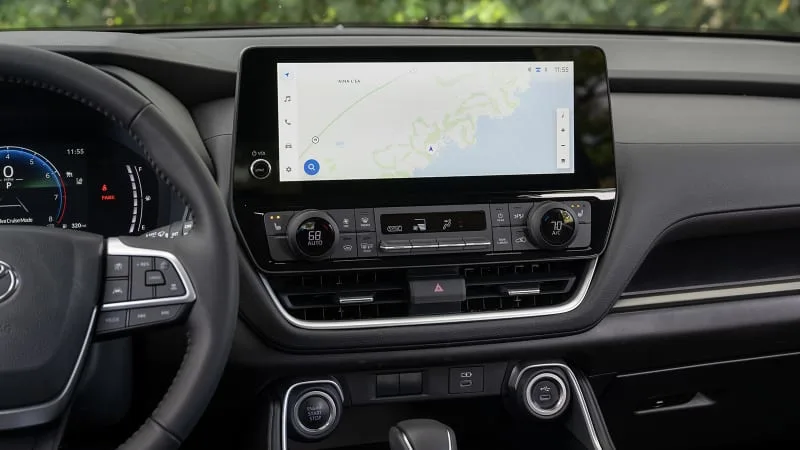
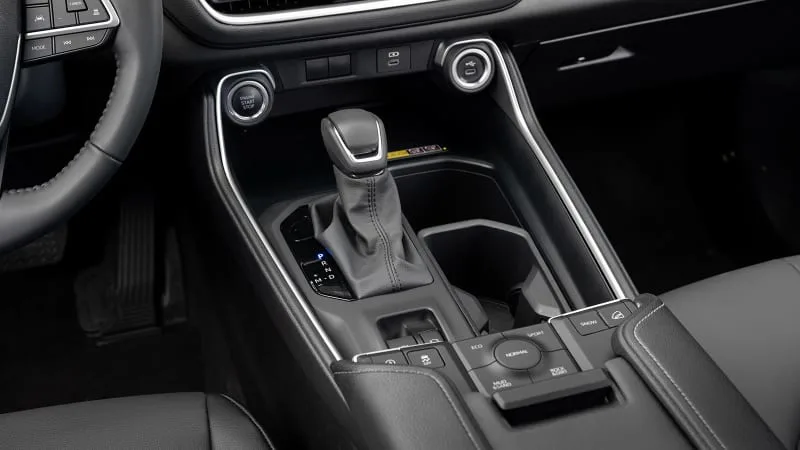
How big is the Grand Highlander?
The Grand Highlander is a three-row vehicle, with a roomier third row than the tight confines in the way back of the standard Highlander. It’s now comfortable enough that we wouldn’t shy away from letting adults sit back there, with a tad more leg- and shoulder room than the Kia Telluride and Hyundai Palisade. The rest of the cabin is roomy, too. The second row can be had with a bench seat or captain’s chairs, allowing for seven- or eight-seat configurations. Regardless of where you sit, you’ll have a healthy amount of head- and legroom.
It also has more cargo volume than the smaller regular Highlander, most notably 20.6 cubic feet behind the third row, which is more than most competitors and just about as much as the generous Kia Telluride. That means you’ll be more likely to actually bring along luggage or groceries without having to fold the third row seats (or invest in a roof-top cargo box). If that’s not enough luggage space, there’s 57.9 cubic feet behind the second row and 97.5 with both rear rows folded.
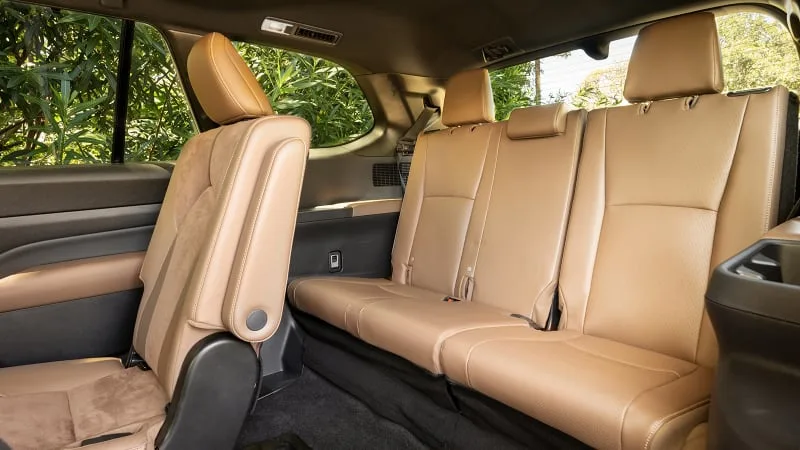
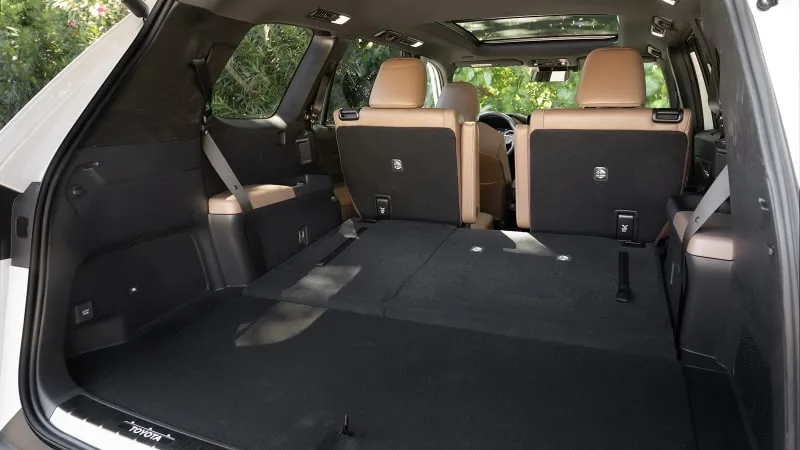
What are the Grand Highlander fuel economy and performance specs?
The Grand Highlander is offered with a choice of three powertrains, two of which are hybrid. The base power plant is an all-gas turbocharged 2.4-liter four-cylinder engine providing 265 horsepower and 310 pound-feet of torque, put to the wheels via an eight-speed automatic transmission. With front-wheel drive, fuel economy is rated at 21 miles per gallon city, 28 mpg highway and 24 mpg combined. All-wheel drive sacrifices a just little bit of that mileage, at 21/27/23 mpg in the XLE, and 20/26/22 mpg in the Limited and Platinum trims.
The efficiency offering is the Grand Highlander Hybrid, with a naturally aspirated 2.5-liter engine paired with an electric motor and battery. It’s less powerful, with 245 system horsepower, but gets better fuel economy. In front-wheel drive, it gets 37 mpg city, 34 mpg city and 36 mpg combined in the XLE. Add all-wheel-drive system to the XLE (it adds another motor, which exclusively powers the rear wheels), and it sees 36/32/34 mpg. Those are the same figures as the Limited with front-wheel drive. The Limited AWD gets 35/31/33 mpg.
The third powertrain offering is the Hybrid Max, which gives up some fuel economy for the best performance in the lineup. It pairs the hybrid system to the 2.4-liter turbo, making a combined 362 system horsepower and 400 lb-ft of torque. It uses a six-speed automatic transmission for a more traditional driving feel. The Hybrid Max is only offered with all-time all-wheel drive, and gets 26/27/27 mpg, which is better than the gas-only Grand Highlander, but not nearly as efficient as the other hybrid powertrain.
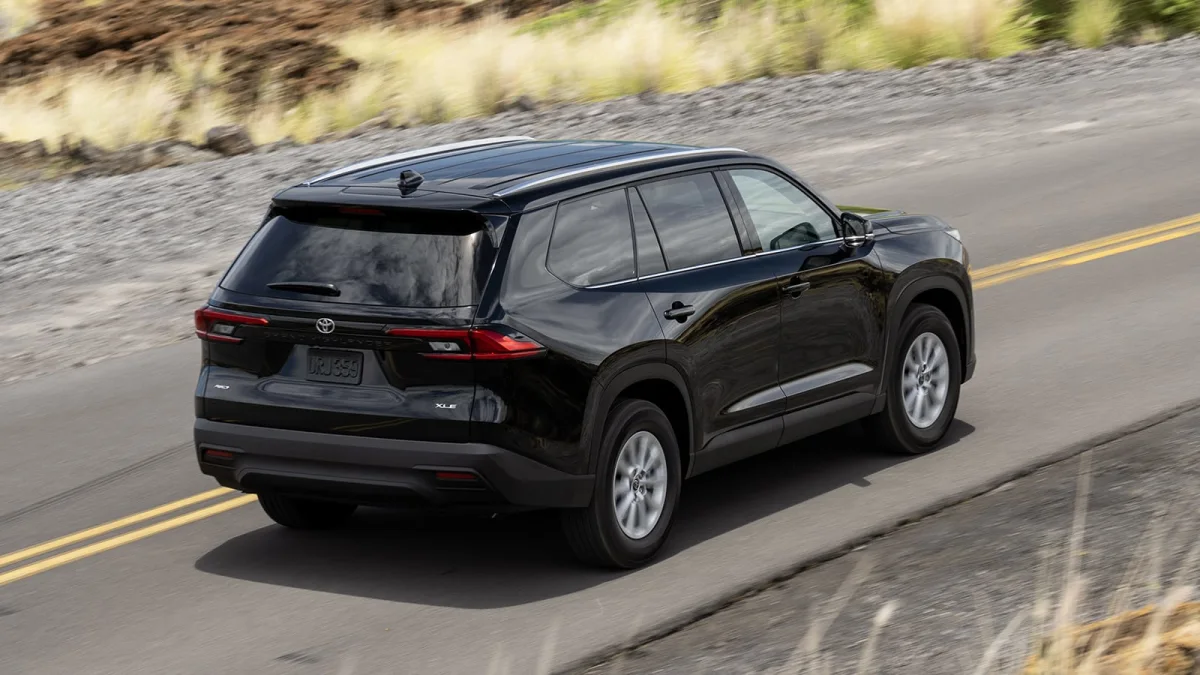
What’s the Grand Highlander like to drive?
While we recommend skipping the gas-only powertrain on the small Highlander in favor of the hybrid, we find the opposite is true, here, assuming that you’re not looking for maximum fuel economy. We don’t hear the as much of the harsh sound of the four-cylinder in the Grand highlander, letting the healthy torque and responsive transmission shine, and giving it a more refined experience.
The Grand Highlander’s basic hybrid is much less enjoyable. Its 245 hp is reaching its limits with 4,455 to 4,710 pounds of curb weight to haul around. Combined with the hybrid powertrain’s electronically controlled CVT, it moves slow and sounds strained, the same as it is in our long-term Toyota Sienna. But, like with our Sienna, the fuel economy is just so gosh-darn impressive that you might be able to forgive it – especially as no competitor with a comparably large interior offers anything like it.
The Hybrid Max is a sweetheart of a powertrain, with a meaty torque band that allows for smooth, easy acceleration, and the six-speed means it isn’t constantly interrupted by shifts or hunting for gears. It’s a surprisingly growly powertrain, helped in part by judicious application of the seamless artificial sound enhancement. And with the full-time all-wheel drive and beefier rear motor, the power split is more evenly distributed. This results in less-pronounced understeer when powering through corners. This all makes the Hybrid Max far and away the most enjoyable powertrain, and we wish Toyota would offer a detuned, more efficient version to supplant the regular hybrid.
While there are significant differences in powertrains, the Grand Highlander’s ride and handling are pretty much the same across the line. Up front is a MacPherson strut setup with a multi-link independent arrangement at the rear, and the shocks are non-adjustable. Each Grand Highlander does have different driving modes, but they mainly adjust throttle and transmission response — even the steering seems unaffected. The tuning is definitely toward comfort and control. It glides over bumps, and stays steady. Handling isn’t quite as eager as a result, what with the softness and body roll. The cabin is also impressively quiet. So as long as you’re not looking to hustle your practical hauler, you’ll be pleased with the Grand Highlander.
What other Toyota Grand Highlander reviews can I read?
2024 Toyota Grand Highlander First Drive Review: ‘Grander’ in size, power and price
This is our first experience behind the wheel of the Grand Highlander, which we find is an improvement over the standard Highlander in far more than just its size.
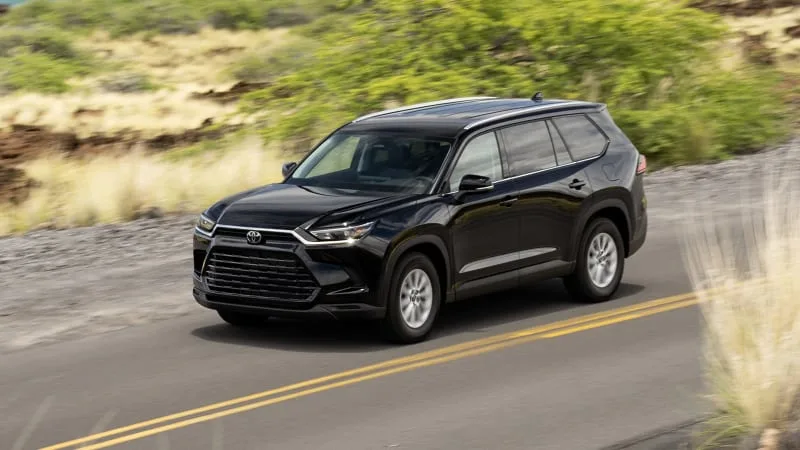
2024 Toyota Grand Highlander Cupholder Mega Test: Will the Nalgene bottle fit?
The Grand Highlander has 15 cupholders. We check them all out and see which ones will fit an oversized water bottle.
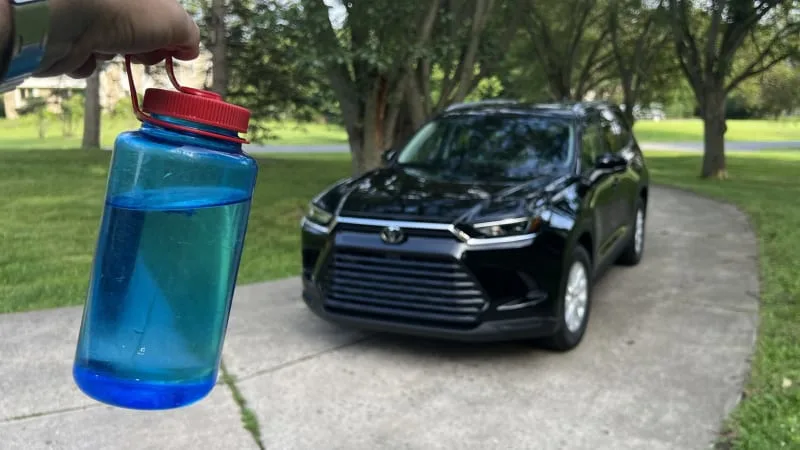
What is the 2024 Grand Highlander price?
The base trim for the Grand Highlander is the XLE, which, with the gas-only powertrain and front-wheel drive, starts at $44,405 including $1,335 in destination. All-wheel drive adds $1,600 to that. The base Grand Highlander Hybrid XLE starts at $46,005.
The XLE models have a decent list of standard equipment, including 18-inch wheels, LED head- and taillights, power liftgate, digital key technology, three-zone automatic climate control, adaptive cruise control, rain-sensing wipers, SofTex leatherette upholstery, second-row sunshades, a 12.3-inch infotainment touchscreen, wireless Apple CarPlay and Android Auto, a wireless phone charger and seven USB-C ports.
Features that show up on the upper trim levels include 20-inch wheels, heated leather seating, a digital instrument panel, head-up display, digital rear-view mirror camera, panoramic glass roof, ambient lighting, JBL premium audio system. There are no sporty or off-road trim levels available (yet) for the Grand Highlander.
Pricing for the 2024 Grand Highlander lineup is as follows:
- XLE FWD: $44,405
- XLE AWD: $46,005
- Limited FWD: $49,195
- Limited AWD: $50,795
- Platinum AWD: $54,880
- Hybrid XLE FWD: $46,005
- Hybrid XLE AWD: $47,605
- Hybrid Limited AWD: $52,395
- Hybrid Max Limited AWD: $55,375
- Hybrid Max Platinum AWD: $59,460
What are the Grand Highlander safety ratings and driver assistance features?
Standard safety equipment includes automatic emergency braking with pedestrian detection, lane-keeping assistance, road sign recognition, automatic high beams, blind-spot and rear cross-traffic warning systems, and adaptive cruise control. Also available are front and rear-parking assist with automatic braking, a panoramic parking camera system and Traffic Jam Assist (which allows hands free-driving on freeways at 25 mph or less).
The Toyota Grand Highlander has not yet been crash tested by either NHTSA or the IIHS as of this writing.
Read the full article here


